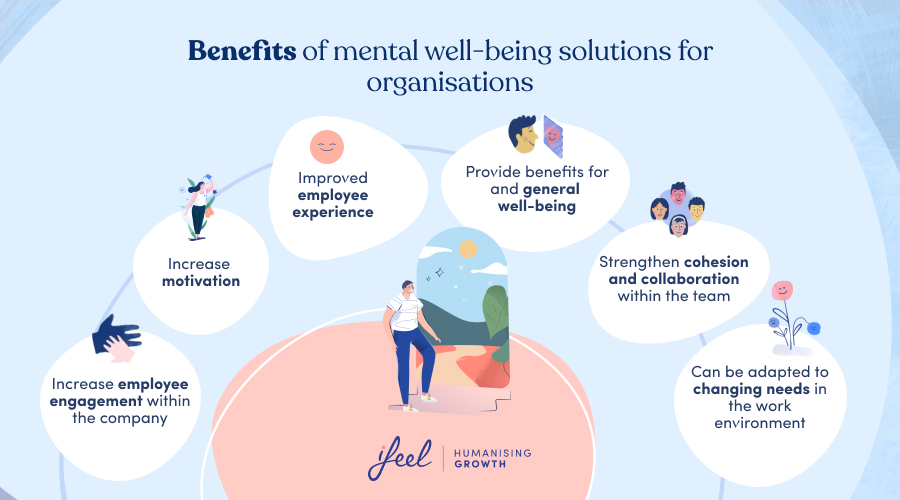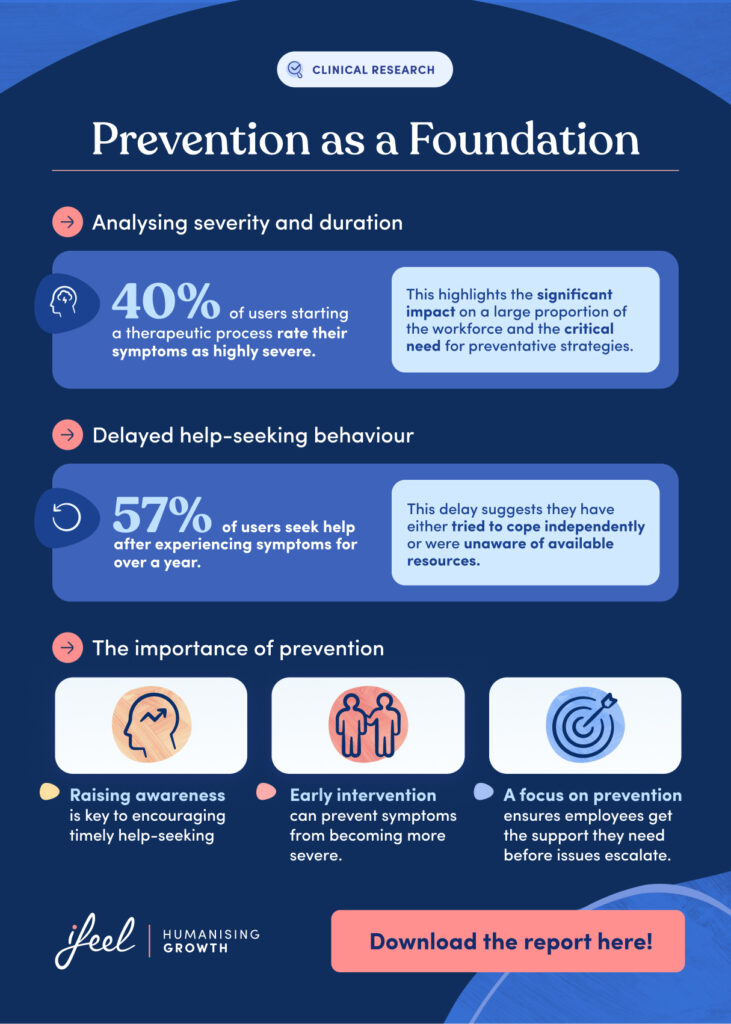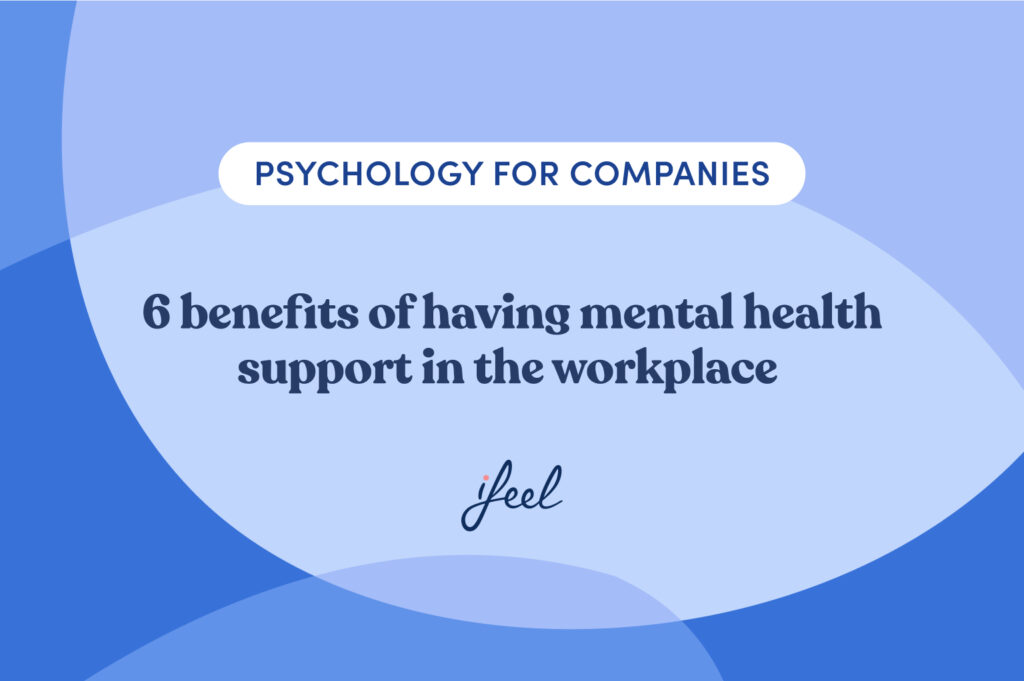Mental health support in the workplace has gained increasing attention due to its crucial nature. A growing number of companies are implementing mental well-being solutions. However, some still have not pinpointed how these issues affect their staff. Implementing such solutions has numerous benefits, not only for employees but also for the company’s overall performance. This article discusses why companies should have mental health support in the workplace, how they can do it, and its benefits.
As an HR leader, how do you address your enterprise’s mental health challenges to enhance resilience and productivity?
Benefits of mental health support in the workplace
Implementing mental health support in the workplace is key if large companies want to maximise their performance and results. But most importantly, it boosts employees’ mental well-being in many ways. Here are some of the benefits of having mental health support in the workplace:

1. Employee engagement
Employee engagement encompasses an employee’s dedication to a company, motivation, and active participation in the workplace. Organisations are increasingly adopting strategies to boost these aspects, with a growing focus on mental health support in the workplace.
The pivotal role of mental health in this context is key, as employees who are healthier, both professionally and personally, demonstrate higher commitment. Furthermore, fostering employee engagement increases productivity and positively impacts overall company performance.
2. Talent management
One of the most negative effects an organisation can suffer is seeing its best employees leave the team early because they feel their work undermines their mental well-being. Therefore, taking care of the workforce, by strategically adopting measures to make their lives easier, is an effective measure to avoid talent drain in large companies.
By fostering a positive and supportive work environment, enterprises can not only retain their top talents but also attract top talent. Studies show that 80% consider mental health support crucial when seeking future employment. Therefore, a job seeker is more likely to apply for a job with numerous benefits, in addition to a competitive salary, especially if the company offers mental health support in the workplace.
3. Reduces absenteeism
If an employee isn’t happy or fulfilled in the workpalce, a lack of employee well-being gradually affects employee engagement, reduces the standard of their work and, in many ways, increases the likelihood that they won’t show up for work and start to neglect their duties. One of the main benefits of mental health support in the workplace is to help prevent absenteeism, helping the company to save overall costs.
Moreover, fostering a mentally healthy work environment not only contributes to greater productivity, but also enhances employee satisfaction, resulting in a more active and efficient workforce.
4. Work-life balance
Encouraging work-life balance as part of mental health support initiatives is critical to preventing poor mental well-being. When people are able to maintain a balance between their professional and personal lives, they are less likely to experience long-term stress and burnout. This balance allows employees to refuel, fostering resilience and a more positive outlook.
In addition, focusing on work-life balance contributes to increased job satisfaction, as employees feel empowered to prioritise personal care and family commitments alongside their jobs. Ultimately, organisations that actively support work-life balance as a feature of mental health care not only cultivate a healthier and more motivated workforce but also position themselves as preferred employers in a competitive labour market.
Tips for implementing mental health support in the workplace
To further support mental health in the workplace, here are practical tips along with how to implement them:
| Initiative | Description |
|---|---|
| Educational programs | Cultivate a culture that encourages discussions about mental health, reduces stigma, and promotes a supportive environment. Ensure employees feel safe to voice concerns without fear of repercussions. |
| Foster open communication | Cultivate a culture that encourages discussions about mental health, reducing stigma and promoting a supportive environment. Ensure employees feel safe to voice concerns without fear of repercussions. |
| Resource allocation | Establish Employee Assistance Programs (EAPs) and ensure employees can access these services. Consider integrating digital mental health apps that provide accessible support. |
| Flexible work arrangements | Offer flexible working hours or remote work options to help employees manage stress and maintain a healthy work-life balance. |
| Managerial training | Provide managers with the necessary training to identify mental health issues and offer appropriate support, fostering a more empathetic leadership approach. |
| Well-being initiatives | Integrate mental health support with physical wellness programs to promote overall well-being, such as mindfulness sessions, fitness classes, or stress management workshops. |
The Leadership Lens🔎
Integrating mental health support in the workplace is not just beneficial but strategically vital. Leaders who prioritise mental well-being show commitment to their employees’ holistic success, which fosters loyalty and innovation. By championing open discussions and utilising mental health resources themselves, leaders can create a supportive culture that enhances both personal and organisational growth.
“I can guarantee is that there is an unshakable faith in the ifeel method and a support that results in more motivation, therefore more recognition, productivity and a sense of belonging to the organization from the employees since we started with ifeel.“
– Vasco Armés, Head of Human Resources at PERI Iberia, an ifeel partner company.
Prioritising prevention
Mental health support in the workplace is a crucial preventive measure as it fosters a culture of awareness, understanding, and intervention. Through workshops and resources, employees gain knowledge about mental health, enabling early detection of potential problems.
Mental health support programmes create an environment where people feel comfortable seeking help before problems escalate. In addition, access to mental well-being solutions such as therapy ensures that employees facing stressful situations or emotional difficulties can quickly receive the help they need, mitigating the risk of mental health problems developing or worsening.
Overall, a workplace committed to mental health support acts as a proactive force, promoting the well-being of its employees and preventing the onset or worsening of mental health problems.
2023 Mental Well-being Trends report: Prevention as a foundation
Our team of psychologists has launched a mental well-being trends report. Our research found that by placing prevention at the forefront, large companies can tackle poor mental well-being amongst the workforce.
ifeel’s research also indicates that 40% of users who start a therapeutic process rate their symptoms as very severe (8 out of 10). This proves we need more research to understand why and shows how important it is to have strategies to prevent these problems from worsening in the first place.
Moreover, 57% of the users who come to ifeel do so after they have already had these symptoms for a year or more, meaning that they come to us when they have already been suffering from these symptoms for a long time. This suggests a significant lag in seeking help for their symptoms, which may suggest that they have attempted to treat their symptoms on their own or that they were unaware of the support resources available to them. This highlights the importance of raising awareness of mental health problems and the need for early intervention and prevention.
Don’t let mental health challenges go unnoticed in your enterprise. Download our groundbreaking mental well-being trends report today and take the first step to implement mental health support in the workplace.

Mental well-being solutions for enterprise organisations
At ifeel, we acknowledge the importance of implementing mental health support in the workplace through preventative strategies to help employees thrive.
To support companies in this process, our team of expert workplace well-being psychologists has created a mental well-being solution for businesses that improves talent retention, reduces presenteeism, and combats employee stress.
With our mental well-being solution, your company’s HR managers can receive personalised, data-driven advice on improving mental health at work. In addition, this solution offers employees a 360° mental well-being service structured at different levels according to their needs. Try our solution now to see how it could help you.
We hope you found this post on mental health support in the workplace interesting. If you would like more information about ifeel’s mental well-being solutions for companies, simply request it, and we will contact your team as soon as possible.







